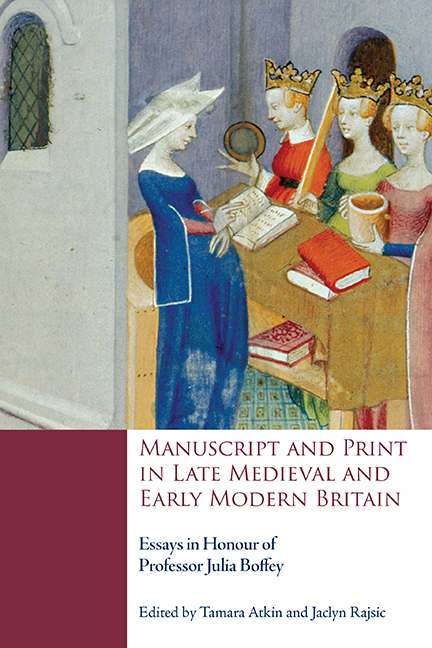 Manuscript and Print in Late Medieval and Early Modern Britain
Manuscript and Print in Late Medieval and Early Modern Britain Book contents
- Frontmatter
- Contents
- List of Illustrations
- List of Contributors
- Acknowledgements
- List of Abbreviations
- Introduction
- PRODUCING TEXTS
- 1 Gower's ‘Epistle to Archbishop Arundel’: The Evidence of Oxford, All Souls College, MS 98
- 2 From Oxford to Eton with Master John Maunshull: Teaching the Tria sunt in Bodleian Library MS Laud misc. 707
- 3 Gavin Douglas, Aesthetic Organization and Individual Distraction
- 4 Gavin Douglas's Eneados: The 1553 Edition and its Early Owners and Readers
- 5 Caxton and the Crown: The Evidence from the Exchequer of Receipt Reconsidered
- 6 Late Medieval Books of Hours and Their Early Tudor Readers In and Around London
- 7 London, British Library, MS Harley 367 and the Antiquarian Ideals of John Stow
- READING INFLUENCE
- Afterword
- Julia Boffey: A Bibliography
- Manuscript Index
- General Index
- Tabula Gratulatoria
5 - Caxton and the Crown: The Evidence from the Exchequer of Receipt Reconsidered
from PRODUCING TEXTS
Published online by Cambridge University Press: 06 September 2019
- Frontmatter
- Contents
- List of Illustrations
- List of Contributors
- Acknowledgements
- List of Abbreviations
- Introduction
- PRODUCING TEXTS
- 1 Gower's ‘Epistle to Archbishop Arundel’: The Evidence of Oxford, All Souls College, MS 98
- 2 From Oxford to Eton with Master John Maunshull: Teaching the Tria sunt in Bodleian Library MS Laud misc. 707
- 3 Gavin Douglas, Aesthetic Organization and Individual Distraction
- 4 Gavin Douglas's Eneados: The 1553 Edition and its Early Owners and Readers
- 5 Caxton and the Crown: The Evidence from the Exchequer of Receipt Reconsidered
- 6 Late Medieval Books of Hours and Their Early Tudor Readers In and Around London
- 7 London, British Library, MS Harley 367 and the Antiquarian Ideals of John Stow
- READING INFLUENCE
- Afterword
- Julia Boffey: A Bibliography
- Manuscript Index
- General Index
- Tabula Gratulatoria
Summary
ALTHOUGH SPECIFIC REFERENCES in the documentary sources to William Caxton's life are not particularly extensive, they are probably only as extensive as one would expect for a prosperous English merchant of the late fifteenth century. A large proportion of these references has been well known for many years. In his 1928 edition of Caxton's prologues and epilogues, W. J. B. Crotch took the opportunity of an extended introduction to set out not only all those references which had been known to William Blades in 1861, but also those new discoveries that he himself had recently made. Inevitably, other references have continued to come to light in the near century since Crotch compiled his appendix. And of course there is now a prodigious literature on Caxton's life, his mercantile circle and social contacts, his continental activities, and on the book trade and his role importing and exporting books, quite apart from the attention of bibliographers to particular editions and printing practices. But relatively few authors since Crotch have made mention of, let alone explored, the three seemingly minor references that Crotch included from the archives of the Exchequer.
It has also long been recognized that there are errors and omissions in Crotch's summary of primary references, and the interpretation that he put on the entries sometimes requires a fuller context. For example, in 1957 Lawrence Tanner published an expansion on Crotch's work on Caxton's various Westminster properties after his return to England in 1476. These were taken mainly from the Westminster Abbey muniments (of which Tanner was then Keeper), and placed the references more broadly in context. But even with this additional work, twenty years later Norman Blake could flag up the shortcomings in our knowledge of Caxton's premises. It was only with Howard Nixon's re-examination of the Westminster sources that some form of clarity on this aspect of Caxton's career emerged. As Blake remarked, ‘other documents are now ripe for study in depth’. As part of this re-examination of the records, this chapter aims to make a closer study of one of the sources in which Caxton is already known to feature, payments made by the Crown through the Exchequer of Receipt.
- Type
- Chapter
- Information
- Manuscript and Print in Late Medieval and Early Modern BritainEssays in Honour of Professor Julia Boffey, pp. 89 - 106Publisher: Boydell & BrewerPrint publication year: 2019


